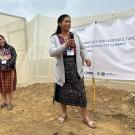
Weather change in Guatemala has adverse effects on horticultural production, causing reductions in productivity and product quality, consequently disrupting the food supply chain. This disruption impacts food and nutrition security, household income, and overall well-being, particularly, for highland farmers who face elevated risks of poverty, malnutrition, limited opportunities, and migration. To address these challenges, this project aims to identify the most effective protective structures, irrigation technologies and harvest and postharvest management practices to ensure the production of high-quality, safe, and nutritious produce, ultimately enhancing food security in the region.
This project is led by Principal Investigator Dr. Rolando Cifuentes and co-investigator Luis Andrés Arévalo from the Center for Agricultural and Food Studies at Universidad del Valle de Guatemala. Researchers will collaborate with grower's associations, women and youth groups, and also involve participation from organizations within the private sector and non-government organizations. The research team will take a multidisciplinary and interdisciplinary approach as part of the implementation process. This approach includes: 1) the development of a baseline; 2) co-creation and co-design of research trials; 3) field implementation and training; and 4) dissemination of the results and success stories. A baseline will be determined using survey and field sampling, as well as focus group validation. This baseline will be used to carry out the process of co-creation and co-design of the different initiatives to be evaluated or established in the field. Field trials will be established with farmers under the premise of ´learning by doing’ for data collection and monitoring.
The research will identify and transfer efficient technologies and practices – including protective structure, drip irrigation, cost-effective cooling and drying systems – to increase production and reduce losses, thereby boosting producer incomes. Findings will enhance the understanding and capabilities of small-scale producers regarding weather change; its impact on agriculture, food and nutrition security, and the importance of agricultural adaptation through technology and sustainable horticultural practices. Research activities will also bolster the business and financial skills of small-scale producers while empowering women and youth through their active involvement in the project's research and knowledge transfer processes.

